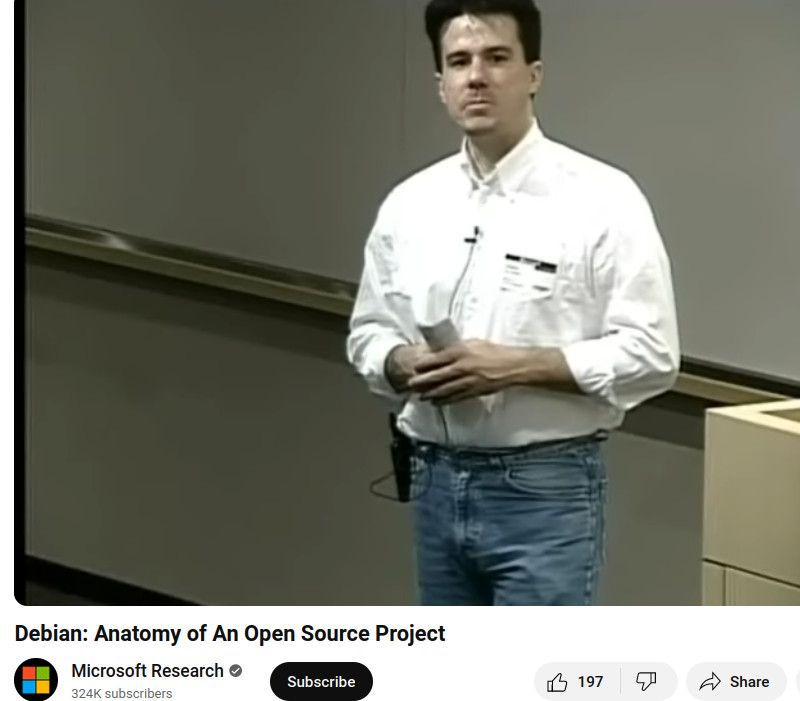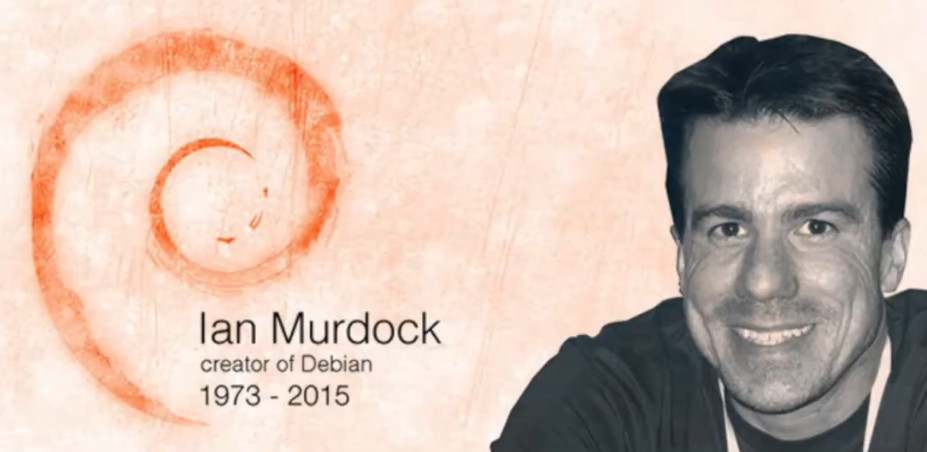Debian running on ISS
“pretty sure that no Windows systems are being used anymore. All/most laptops used by the astronauts have a Linux based operating systems (Debian)” (src: space.stackexchange.com)
2007: Debian: Anatomy of An Open Source Project
WARNING! SHOCKING! NO HAPPY END 🙁 life and death of Ian Ashley Murdock Author of the 1994 Debian Manifesto
the world is a harsh place…
“Murdock’s first name was the “Ian” in “Debian”
“The police here beat me up for [knocking] on my neighbor’s door.. they sent me to the hospital,” he wrote. “They followed me home… then they pulled me out of my house and did it again” …
“His neighbor told investigators that Murdock had recently broken up with his girlfriend and was being evicted from his home at the end of the month, according to the report.” (src)
“Ian Ashley Murdock (April 28, 1973 – December 28, 2015) was an American software engineer, known for being the founder of the Debian project and Progeny Linux Systems, a commercial Linux company… While a college student, Murdock founded the Debian project in August 1993, and wrote the Debian Manifesto in January 1994. ” (src)
author of the:
1994: The Debian Manifesto
src: https://www.debian.org/doc/manuals/project-history/manifesto.en.html
Table of Contents
- A.1. What is Debian Linux?
- A.2. Why is Debian being constructed?
- A.3. How will Debian attempt to put an end to these problems?
Written by Ian A. Murdock, Revised 01/06/94
A.1. What is Debian Linux?
Debian Linux is a brand-new kind of Linux distribution.
Rather than being developed by one isolated individual or group, as other distributions of Linux have been developed in the past, Debian is being developed openly in the spirit of Linux and GNU.
The primary purpose of the Debian project is to finally create a distribution that lives up to the Linux name.
Debian is being carefully and conscientiously put together and will be maintained and supported with similar care.
It is also an attempt to create a non-commercial distribution that will be able to effectively compete in the commercial market.
It will eventually be distributed by The Free Software Foundation on CD-ROM, and The Debian Linux Association will offer the distribution on floppy disk and tape along with printed manuals, technical support and other end-user essentials.
All of the above will be available at little more than cost, and the excess will be put toward further development of free software for all users.
Such distribution is essential to the success of the Linux operating system in the commercial market, and it must be done by organizations in a position to successfully advance and advocate free software without the pressure of profits or returns.
A.2. Why is Debian being constructed?
Distributions are essential to the future of Linux. Essentially, they eliminate the need for the user to locate, download, compile, install and integrate a fairly large number of essential tools to assemble a working Linux system.
Instead, the burden of system construction is placed on the distribution creator, whose work can be shared with thousands of other users.
Almost all users of Linux will get their first taste of it through a distribution, and most users will continue to use a distribution for the sake of convenience even after they are familiar with the operating system.
Thus, distributions play a very important role indeed.
Despite their obvious importance, distributions have attracted little attention from developers.
There is a simple reason for this: they are neither easy nor glamorous to construct and require a great deal of ongoing effort from the creator to keep the distribution bug-free and up-to-date.
It is one thing to put together a system from scratch; it is quite another to ensure that the system is easy for others to install, is installable and usable under a wide variety of hardware configurations, contains software that others will find useful, and is updated when the components themselves are improved.
Many distributions have started out as fairly good systems, but as time passes attention to maintaining the distribution becomes a secondary concern.
A case-in-point is the Softlanding Linux System (better known as SLS).
It is quite possibly the most bug-ridden and badly maintained Linux distribution available; unfortunately, it is also quite possibly the most popular.
It is, without question, the distribution that attracts the most attention from the many commercial “distributors” of Linux that have surfaced to capitalize on the growing popularity of the operating system.
This is a bad combination indeed, as most people who obtain Linux from these “distributors” receive a bug-ridden and badly maintained Linux distribution.
As if this wasn’t bad enough, these “distributors” have a disturbing tendency to misleadingly advertise non-functional or extremely unstable “features” of their product.
Combine this with the fact that the buyers will, of course, expect the product to live up to its advertisement and the fact that many may believe it to be a commercial operating system (there is also a tendency not to mention that Linux is free nor that it is distributed under the GNU General Public License).
To top it all off, these “distributors” are actually making enough money from their effort to justify buying larger advertisements in more magazines;
it is the classic example of unacceptable behavior being rewarded by those who simply do not know any better.
Clearly something needs to be done to remedy the situation.
A.3. How will Debian attempt to put an end to these problems?
The Debian design process is open to ensure that the system is of the highest quality and that it reflects the needs of the user community.
By involving others with a wide range of abilities and backgrounds, Debian is able to be developed in a modular fashion.
Its components are of high quality because those with expertise in a certain area are given the opportunity to construct or maintain the individual components of Debian involving that area.
Involving others also ensures that valuable suggestions for improvement can be incorporated into the distribution during its development; thus, a distribution is created based on the needs and wants of the users rather than the needs and wants of the constructor.
It is very difficult for one individual or small group to anticipate these needs and wants in advance without direct input from others.
Debian Linux will also be distributed on physical media by the Free Software Foundation and the Debian Linux Association.
This provides Debian to users without access to the Internet or FTP and additionally makes products and services such as printed manuals and technical support available to all users of the system.
In this way, Debian may be used by many more individuals and organizations than is otherwise possible, the focus will be on providing a first-class product and not on profits or returns, and the margin from the products and services provided may be used to improve the software itself for all users whether they paid to obtain it or not.
The Free Software Foundation plays an extremely important role in the future of Debian.
well: https://www.gnu.org/distros/common-distros.html writes: not nonfree enough?
“Until 2022, Debian GNU/Linux came fairly close to qualifying as a free distro: it was simple to specify that you wanted to install Debian without any nonfree software.
Debian’s Social Contract states the goal of making Debian entirely free software, and Debian conscientiously keeps nonfree software out of the official Debian system.
However, Debian also maintains a repository of nonfree software.
It asserts that this software is “not part of the Debian system,” but the repository is hosted on many of the project’s main servers, so people are likely to learn from Debian itself about those nonfree packages by browsing Debian’s package database and wiki, and then might install them.
Until 2022, Debian GNU/Linux did not offer nonfree packages for installation unless the user explicitly enabled use of that repository.
Thus, it was easy to make a free installation if you wanted to.
That is no longer true, because Debian has changed its policy.
In Debian 12, initially, the installer offered to install nonfree firmware whenever some hardware devices “needed” that.
Since then, there has been another change for the worse.
Debian now recommends preferentially a new installer program which, on most computers, installs all the nonfree firmware without even asking.
It is no longer easy to install only the free packages of Debian.
There are ways to request this, but they require specific knowledge.
See Optionally Free Is Not Enough.
In effect, Debian has become more like the other nonfree distros.
Debian also has a “contrib” repository; its packages are free, but some of them exist to load separately distributed proprietary programs.
This too is not thoroughly separated from the main Debian distribution.
In addition, some of the free programs that are officially part of Debian invite the user to install some nonfree programs.
Specifically, the Debian versions of Firefox and Chromium suggest nonfree plug-ins to install into them.
Debian’s wiki also includes pages about installing nonfree firmware.”
back to manifesto:
“By the simple fact that they will be distributing it, a message is sent to the world that Linux is not a commercial product and that it never should be, but that this does not mean that Linux will never be able to compete commercially. For those of you who disagree, I challenge you to rationalize the success of GNU Emacs and GCC, which are not commercial software but which have had quite an impact on the commercial market regardless of that fact.
The time has come to concentrate on the future of Linux rather than on the destructive goal of enriching oneself at the expense of the entire Linux community and its future. The development and distribution of Debian may not be the answer to the problems that I have outlined in the Manifesto, but I hope that it will at least attract enough attention to these problems to allow them to be solved.”
src: https://www.debian.org/doc/manuals/project-history/manifesto.en.html
More videos: https://www.youtube.com/results?search_query=ian+murdock
Problem: Proposal D would have been FSF compatible 🙁 https://www.debian.org/vote/2022/vote_003
liked this article?
- only together we can create a truly free world
- plz support dwaves to keep it up & running!
- (yes the info on the internet is (mostly) free but beer is still not free (still have to work on that))
- really really hate advertisement
- contribute: whenever a solution was found, blog about it for others to find!
- talk about, recommend & link to this blog and articles
- thanks to all who contribute!



